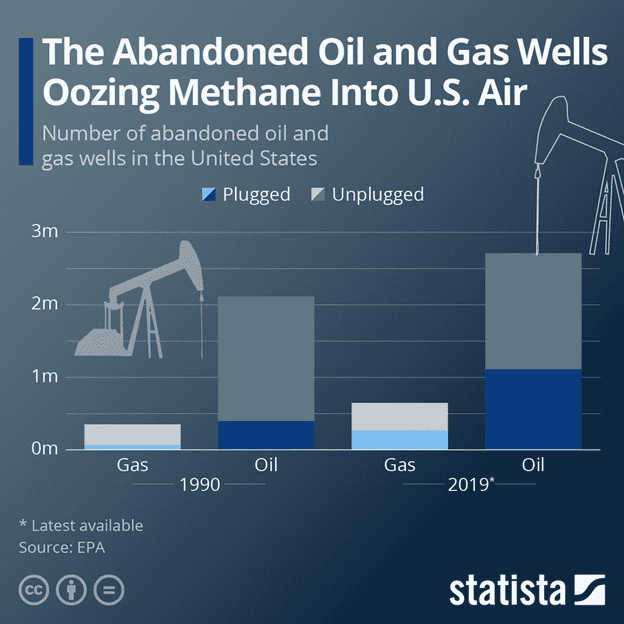The Inflation Reduction Act has just committed $350 billion to combat climate change. The Act, approved by Congress last week, also contains provisions to penalize companies that produce excess methane gas, a key contributor to global warming.
“Great!” you might say. “At last something serious is being done about greenhouse gasses.”
If we are serious about cutting methane emissions, before beating up on businesses or clamping down on cows, we should be looking to do something about the tens of thousands of government-owned oil and gas wells that lie abandoned across America.
Why? These orphan wells, drilled by businesses that have long since ceased to operate them, are one of the biggest sources of methane emission. Publicly owned, but for practical purposes simply abandoned, many of them have been cheerfully spewing out methane for years.
According to the Mississippi State Oil and Gas Board in our state alone “there are roughly 23,500 wells with a plugged and abandoned status or those which have no associated operator”. Some of these are effectively sealed, but an unknown number are not. According to industry insiders, there are an estimated 400 wells drilled between 1940 and 1970 which may or may not have been plugged but no such records can be located.
If even a fraction of Mississippi’s 23,500 old wells are leaking methane, they collectively account for a serious amount of methane over the years.
Research conducted by Amy Townsend-Small, a geology professor at the University of Cincinnati, found that idle oil wells emit an average of 6.2 grams of methane per hour, although some have emissions as high as 132 grams per hour. Multiply that by the number of leaky wells, and the number of years they have sat abandoned, and you soon have a serious source of methane pollution.
No doubt if government bureaucrats were required to tackle a pollution problem caused by wells that the government owns they would devise a costly program in response. But what if there was a no-cost alternative that could fix the problem instead?
Orphan wells are able to carry on emitting methane because they are publicly owned. As Aristotle once suggested, that which no one owns, nobody cares for. Or as Milton Friedman more recently echoed, “when everybody owns something, nobody owns it.”
Today, oil companies have almost no incentive to plug orphaned wells that they do not own. In order to get them to cap uncapped wells, you would need to literally pay them, or force them to set aside funds to do so at the outset of any new exploration.
But what if you aligned the interests of oil companies with those that want to see the wells properly sealed? Why not allow oil companies to buy up bundles of orphaned wells? Instead of sitting there ignored and unloved, you could allow private businesses to buy them in return for a promise to take care of them. Privatized wells would have to be either properly plugged or else reactivated.
Over the past few decades, there have been some remarkable advances in oil extraction technology. 3-D seismic imaging and developments in horizontal drilling mean that fields that were long ago considered exhausted have been brought back into production, with often striking results.
Auctioning off bundles of orphaned wells could work if oil companies were allowed to use new extraction techniques in old fields. Any business contemplating whether to bid for a bundle of old wells would have to weigh up the cost of having to cap any that were unproductive with the potential gains from additional extraction.
Instead of having to wait for federal bureaucrats to take the initiative on this, this is a policy proposal that states like Mississippi could take themselves. Mississippi should consider passing a law to allow publicly owned orphaned wells to be bought by private firms, on the understanding that they are either capped properly or brought back into production.
Perhaps this would not provide sufficient incentive for private firms to want to incur the cost of capping for an uncertain return on wells that might be brought back into production. Maybe additional incentives are needed to encourage private enterprises to cap them. I have no doubt that this idea could be improved upon.
But the best way to reduce methane emissions is by creating incentives that get private enterprises involved. Allowing private firms to buy orphan wells might just do something about methane emissions while raising more tax revenue for our state, creating more work for oil workers, and providing more energy for America.

Read original article by clicking here.

